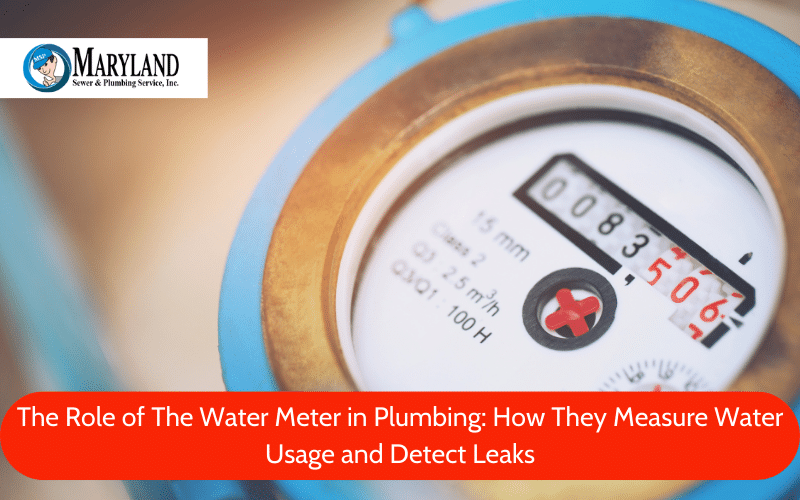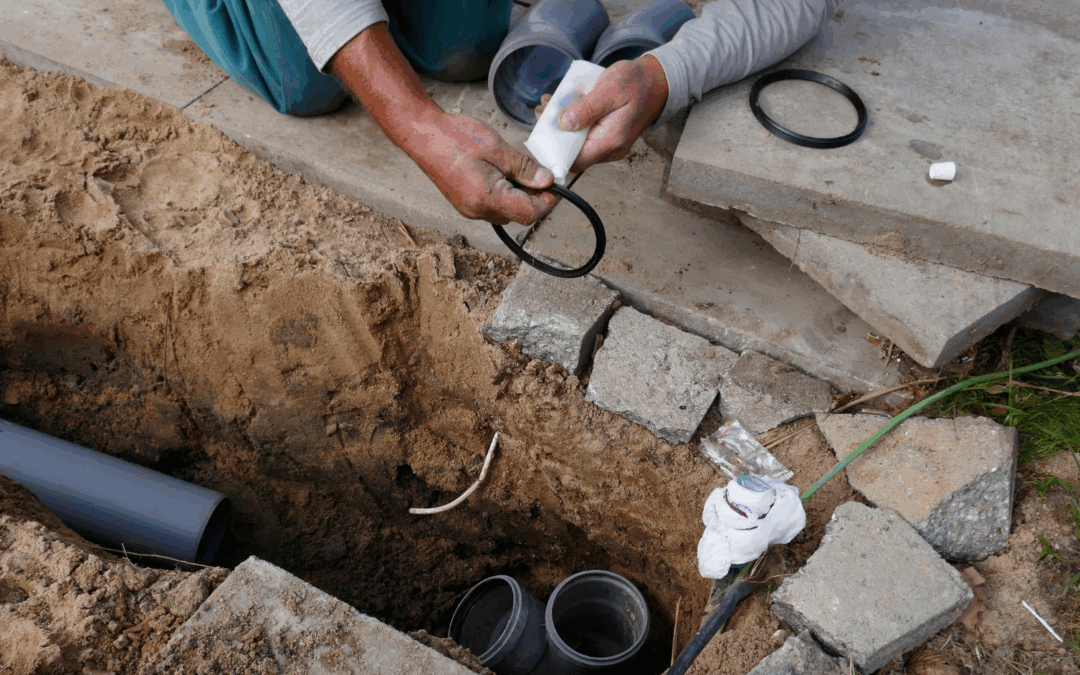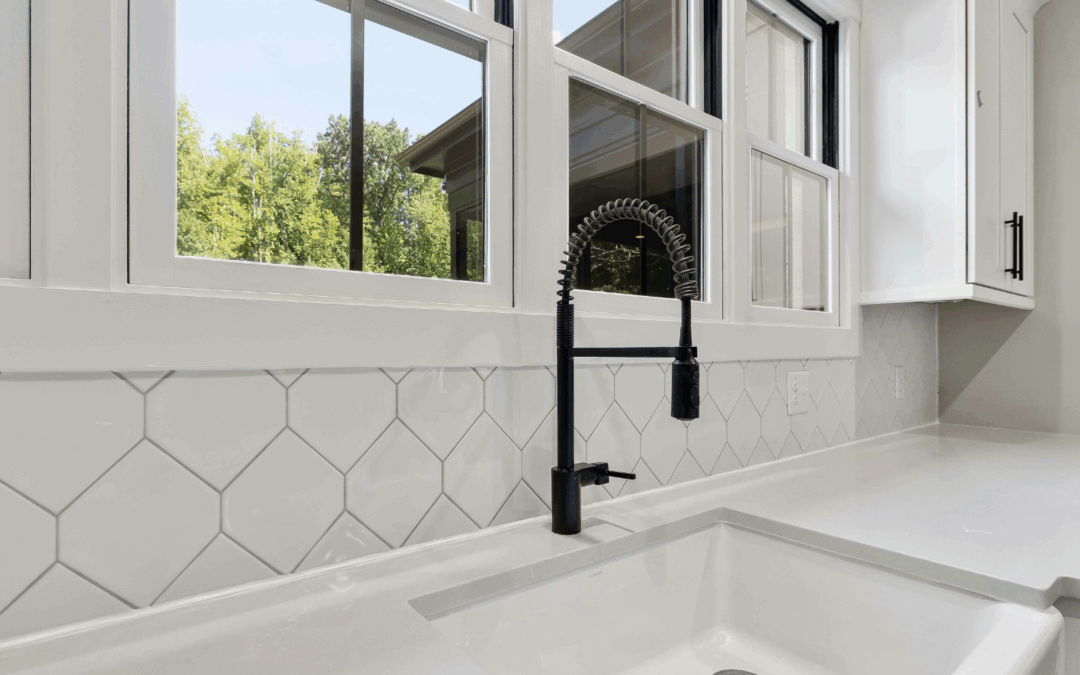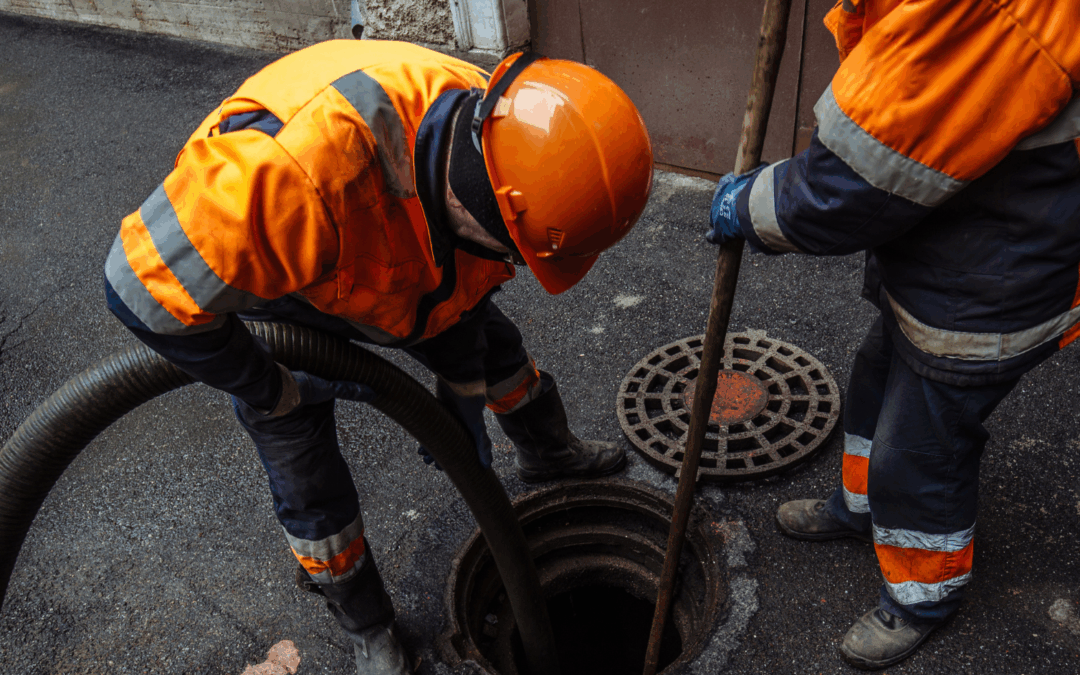In plumbing, a water meter serves two primary functions – measuring water use and detecting leaks. By providing precise water usage data, these meters enable homeowners to make informed decisions about their water consumption habits.
Furthermore, unusual spikes in water use can alert homeowners to possible leaks within their plumbing system, allowing for swift repairs that save water and reduce costs.
Top view of the water meter to regulate the amount of household water usage
Schedule Service Online
Get a free estimate so you know what you're signing up for
"*" indicates required fields
For Emergency Services Call: 410-255-9300
Benefits of Water Meters for Homeowners and the Environment
Installing a water meter offers numerous benefits:
- Financial Savings: By measuring actual water use, meters ensure homeowners are only billed for the water they consume, potentially lowering water bills.
- Environmental Conservation: Accurate water usage data encourages responsible water consumption, contributing to broader environmental conservation efforts.
- Leak Detection: Early leak detection helps in averting potential water damage and conserving water resources.
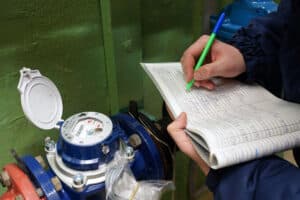
Types of Water Meters: Mechanical vs. Digital Meters
Water meters fall into two main categories: mechanical and digital.
- Mechanical Water Meters: These meters rely on the physical movement of water to measure flow rates. A turbine or propeller turns as water passes through the meter, with the revolutions counted to determine usage.
- Digital Water Meters: Also known as smart meters, these devices use electronic components to measure and record water flow rate. Many digital meters offer remote reading capabilities, allowing for more frequent and accurate data collection.
Water Meter Installation and Maintenance: Best Practices
Proper installation and maintenance are crucial for the accurate and efficient operation of water meters.
Here are a few best practices:
- Installation: Should always be performed by a professional plumber or a utility company representative to ensure correct placement and setup.
- Regular Checks: Periodically inspect the water meter for any signs of damage or tampering.
- Winterization: In colder climates, ensure your water meter is adequately insulated to prevent freezing.
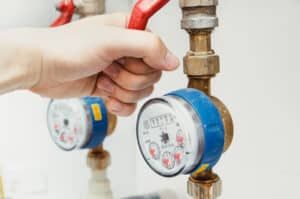
Common Water Meter Problems in Plumbing
Encountering issues with water meters and pulse output is not uncommon in both residential water metering and commercial settings. Understanding these problems can help in early detection and prevent potential water loss or billing inaccuracies. Here are some of the most frequent issues associated with water meters:
- Inaccurate Readings: This is often the result of sediment build-up inside the meter, aging mechanisms, or improper installation, leading to under or overestimation of water usage.
- Leaks: Small leaks within or around the water meter can not only cause water wastage but also lead to significant increases in water bills if undetected over time.
- Obstruction: Over time, debris, dirt, or even mineral deposits may obstruct the water flow meter, affecting its accuracy and functionality.
- Wear and Tear: Mechanical meters, especially, are prone to wear and tear due to their moving parts. This natural degradation can impact the meter’s precision and overall operation.
- Frost Damage: In colder climates, water meters without proper insulation can freeze, causing the meter to crack or break.
Promptly addressing these common issues can ensure that water meters function efficiently, maintaining accurate water usage data and supporting effective water management practices.
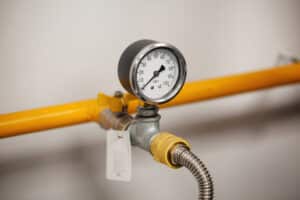
Pipe with pressure gauge, close up, selective focus.
The Integral Relationship Between Water Meters and Plumbing
No one typically considers the connection between the water meter and the plumbing system, yet understanding this relationship is crucial. Knowing who to contact—the plumbing company or the city’s water department—in case of issues depends on this very connection.
The water meter is essentially the point where the responsibility for water service transitions from the utility provider to the homeowner. Everything from the water meter towards the city’s supply is the responsibility of the water utility company. This includes the main water line running under the street. Conversely, any part of the system from the water meter to the house falls under the homeowner’s responsibility. This means that if there’s a leak or any issue beyond the meter, towards the house, it’s up to the homeowner to fix it, often requiring the services of a professional plumber. Understanding this delineation is essential for addressing water issues promptly and effectively.
1. Detection of Leaks
Perhaps one of the most valuable roles of water meters within a plumbing system is their ability to detect leaks. Unnoticed leaks can lead to extensive water waste and significant damage over time, plus your water pressure will likely be low.
A sudden change in water meter measures, when no additional water usage is accounted for, often signals a leak within the system. Early detection can save thousands of gallons of water and prevent potential damage to the property.
2. Water Conservation
Water meters encourage conservation efforts by making users more aware of their water consumption patterns. When consumers are charged based on usage, they are more likely to adopt water-saving practices.
This not only results in lower water bills but also promotes the sustainable use of water resources. In many cases, municipalities offer water-saving tips and tools based on data collected from water meters, helping communities reduce their overall water footprint.
In light of the delineation of responsibility between homeowners and utility providers, homeowners have a unique opportunity to contribute to water conservation efforts directly. Implementing water-saving installations in the home is a proactive approach to not only conserving this vital resource but also potentially reducing water bills and save money. Such installations can include low-flow toilets and showerheads, modern irrigation systems that minimize waste, and water-efficient appliances.
Additionally, rainwater harvesting systems can be installed to collect and reuse water for landscaping and non-potable purposes. Educating homeowners on the installation and benefits of these systems can play a crucial role in fostering a community-wide commitment to water conservation.
3. Improved Water Distribution
In larger contexts, such as city planning and management, water meters assist in the equitable and efficient distribution of water.
By analyzing consumption data, planners can identify areas with higher demand, adjust supply accordingly, or pinpoint regions where infrastructure improvements are necessary. This ensures that all users have sufficient access to water and contributes to the overall efficiency of the water supply system.
4. Data Collection for Future Planning
The data collected from water meters is invaluable for forecasting future water needs and planning infrastructure developments.
Through consistent monitoring and analyzing trends over time, authorities can make informed decisions about water recycling, rainwater harvesting, and other sustainable water management strategies.
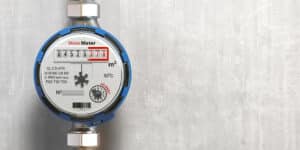
Choosing the Right Water Meter
When it comes to selecting a water meter, there are various types to consider, including mechanical, digital, and smart meters, each with its unique benefits.
Smart water meters, in particular, offer real-time data tracking and the ability to monitor water usage via smartphone apps, providing unparalleled convenience and control over water consumption.
While the initial installation or upgrade to a more advanced meter may represent an upfront cost, the long-term savings, both financially and environmentally, can be significant.
It is advisable to consult with a professional plumber to determine the most suitable type of water meter for your specific needs, bearing in mind factors such as property size, water usage patterns, and budget.
Common Questions About Water Meters
Understanding the nuances and operations of water meters can often lead to a myriad of questions from homeowners and businesses alike.
This section aims to demystify some of the most common inquiries about water meters, covering everything from their basic functionality and maintenance requirements to their broader implications on water conservation and billing.
By addressing these questions, we hope to provide a clearer picture of how water meters work within the context of managing water resources efficiently and sustainably.
Q: How Often Should I Get A Water Meter Reading?
Water meters are typically read on a monthly basis to provide up-to-date billing and to monitor water usage patterns. However, the frequency can vary by municipality or utility provider.
Q: What Should I Do if I Suspect My Water Meter Is Not Accurate?
If you believe your water meter is not recording accurately, you should contact your water utility provider to request a meter test. Many providers will perform the first test for free, but subsequent tests may incur a fee if the meter is found to be accurate.
Q: Can a Faulty Water Meter Lead to Higher Bills?
Yes, a malfunctioning water meter can either overestimate or underestimate water usage, leading to inaccuracies in billing. If you notice a sudden, unexplained increase in your water bill, it’s advisable to check for leaks and to contact your provider about testing the meter.
Q: Is It Possible to Monitor My Water Usage in Real Time?
Some modern water meters, especially smart meters, allow for real-time monitoring of water consumption through a digital interface or mobile app. This enables consumers to track their usage closely, detect leaks early, and manage water more efficiently.
When to Call a Plumber or the City Water for Water Meter Issues
Determining whether to call a plumber or your city’s water department when facing issues with your water meter depends on the nature of the problem. Generally, if the issue is within your property, including leaks immediately after the meter or problems with the plumbing that could affect the meter’s performance, it’s best to contact a licensed plumber.
Plumbers are equipped to handle on-site repairs, leak detections, and any adjustments needed within your property’s plumbing system.
On the other hand, if the problem appears to be with the meter itself (e.g., it’s not recording water usage accurately, or there’s visible damage to the meter) or if there are issues with the water supply before it reaches your meter, your city’s water department should be your first point of call.
hey are responsible for the maintenance and accurate functioning of the water meter and the main supply line up to the point of your meter. In cases where there’s an unusually high bill without a corresponding increase in water usage, the city can also conduct tests to determine if the meter is functioning correctly.
Knowing whom to call when issues arise can help address and resolve them more efficiently, ensuring that your water meter and plumbing system remain in optimal condition.
The Future of Water Meter Technology and Its Impact on Plumbing
The future of water meter technology is promising, with advancements aimed at enhancing accuracy, ease of use, and additional features like real-time usage tracking and automated leak detection alerts.
These innovations not only have the potential to revolutionize how homeowners and utilities manage water but also underscore the importance of integrating smart technologies into plumbing systems for sustainable management.
MD Sewer and Plumbing is here for your water meter needs, and if you have any questions if its us or your cities water service!

The Importance of Water Meters in Sustainable Living and Plumbing
Water meters play a pivotal role in the effective management of water resources, offering benefits that stretch beyond simple usage measurement. They are fundamental tools for promoting water conservation, reducing waste, and fostering sustainable living practices.
As technology advances, the capabilities of water meters will continue to expand, further impacting plumbing practices and environmental conservation efforts positively.
In understanding the importance and functionality of displacement water meters, homeowners and industry professionals alike can take proactive steps toward more responsible water usage and conservation, contributing to global efforts to preserve this vital resource for future generations.

